Choosing the Best Avian Veterinarians Near You
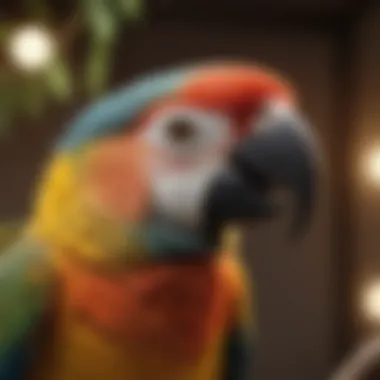
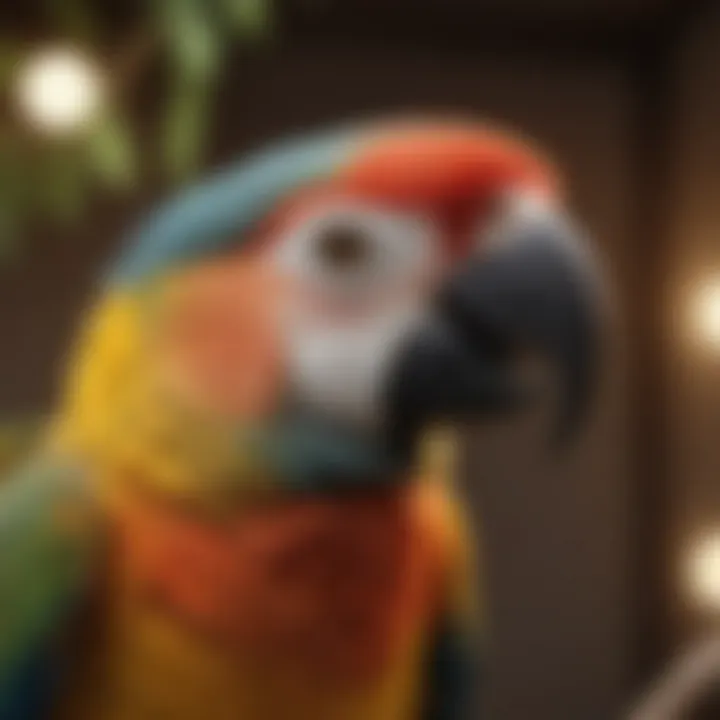
Intro
When it comes to caring for our feathered companions, the importance of finding the right veterinarian cannot be overstated. Birds are not like cats or dogs; they have unique needs and health considerations that require specialized attention. As pet owners, we must take the time to understand these needs in order to ensure that our avian friends enjoy happy, healthy lives. This article is dedicated to guiding you on how to find the appropriate vets for birds in your area, taking care to highlight the specific factors that contribute to effective avian healthcare.
Understanding Your Pet
Having a bird as a pet means immersing oneself into a remarkably diverse world of species, each with distinct behavioral patterns and health requirements. Fostering a solid grasp on what makes your pet tick is central to selecting the right vet.
Pet Behavior Basics
Birds exhibit a wide range of behaviors, from the playful antics of parakeets to the subtle shy gestures of finches. Knowing the differences between these behaviors helps owners better understand their birds and communicate effectively with their veterinarians. Recognizing what's typical and what's concerning can be crucial in spotting health issues before they escalate.
Common Breed Characteristics
The characteristics of your bird's breed can heavily influence their health and care needs. For instance, African Grey Parrots are renowned for their intelligence but require significant mental stimulation. Conversely, budgerigars are easier to care for yet can still encounter breed-specific health problems. Understanding these traits enables owners to seek a vet who is experienced with their particular type of bird, ensuring specialized care tailored to the bird’s breed.
Species-Specific Needs
Different species, such as cockatiels, lovebirds, and macaws, have specific dietary and environmental needs. For example, while cockatiels may thrive on a seed-based diet, larger parrots like macaws require more varied nutrition. Finding a vet who recognizes these needs is pivotal—one who can advise you on diet, housing, and behavioral enrichment geared toward your bird’s species.
Pet Care and Maintenance
Ensuring your bird remains in peak health requires diligence on various fronts. From feeding to general hygiene, every little aspect contributes to overall wellbeing.
Feeding Guidelines
A balanced diet is vital for the health of your bird. Different species have unique nutritional requirements, so it is essential to understand what your bird should eat. Appropriately certified avian veterinarians can provide insights into the suitable food that fortifies your bird’s health. Always examine if the vet can recommend reputable brands that align with your bird's species.
Grooming Essentials
Personal care extends beyond just feeding. Birds also need regular grooming to maintain their feathers and beaks. A vet experienced in avian care can offer tips and services for nail trimming, feather maintenance, and beak care. These grooming tasks should not be overlooked, as they can greatly affect a bird's happiness and comfort.
Hygiene Practices
Maintaining a clean environment for your feathered friend is a must. This includes regularly cleaning their cages, toys, and food dishes. A local vet may help by suggesting safe cleaning products that do not harm the bird and can provide guidance on hygiene practices to ensure a limited risk of infections or diseases.
Health and Wellness
Routine health checks are a cornerstone of responsible pet ownership. It’s a vital way to stay ahead of health issues, ensuring your bird remains vibrant and well.
Routine Vet Check-ups
Birds are notorious for hiding their illnesses until it's quite advanced. Regular check-ups help catch any underlying health concerns early on. A vet who understands the specific nuances of bird health will be able to perform thorough examinations and suggest preventive measures tailored to your pet's needs.
Vaccination Needs
While birds generally require fewer vaccinations than other pets, there are still pertinent vaccinations that must not be ignored. Make sure to consult your local avian vet regarding any specific vaccinations recommended for your breed of bird.
Recognizing Signs of Illness
Bird owners should be alert to signs that may indicate illness—changes in behavior, feather condition, or appetite can all signal issues. By having an experienced vet to consult, you can be better prepared and informed about what to watch for in your pet's daily life.
Enrichment and Activities
To maintain a healthy bird, mental and physical stimulation is key. Engaging your bird in various activities can prevent boredom and behavioral issues.
Indoor vs. Outdoor Activities
Depending on the species, some birds thrive indoors with stimulating toys while others enjoy supervised outings outdoors. Understanding what suits your bird best is essential, and this might be something to discuss with an avian doctor.
Interactive Toys and Games
Many birds thrive when integrated with interactive toys designed specifically for them. You might search for recommendations from your vet or trustworthy sources that cater to avians.
Socialization Opportunities
Birds are social creatures and require interaction, whether with humans, other birds, or their environment. Make sure to create opportunities for your bird to engage socially, as it’s just as important as physical activities for their mental health.
Finding the right veterinarian can make all the difference in your bird's life. The appropriate skills and insights can not only help with treatment, but also educate owners on specific care requirements.
Intro to Avian Veterinary Care
In the world of pet ownership, many folks might not realize just how critical avian veterinary care is. Birds are not your average pets; they're unique creatures that come with their own list of health concerns and requirements. Their specialized needs cannot be overlooked, and ensuring they receive the proper care is more than just a matter of convenience—it's a necessity that can significantly affect their quality of life.
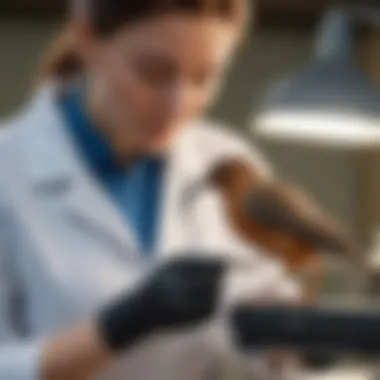
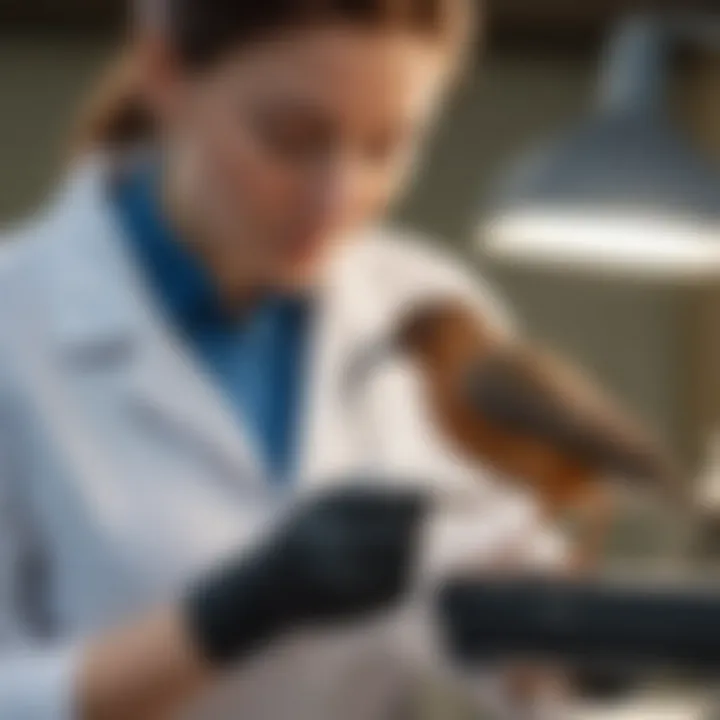
Birds, just like cats and dogs, can fall ill, and unfortunately, the symptoms aren't always clear. Owners might miss subtle signs that their feathered friends need medical attention. This perspective underscores the importance of seeking out veterinarians who specialize in avian medicine. Having a vet who is well-versed in the unique intricacies of bird health can mean the difference between a full recovery or prolonged suffering.
Importance of Specialized Care for Birds
Birds have various physiological and behavioral characteristics that set them apart from other pets. For instance, unlike mammals, birds have a unique metabolism, which means diseases can manifest differently. Many people assume that a regular vet can treat birds just as they do cats or dogs, but that assumption can lead to misdiagnosis or inadequate treatment.
Choosing a veterinarian who understands the world of avian health is crucial. These professionals are trained to recognize the subtle differences in bird anatomy and behavior, which could indicate underlying issues. This specialized care not only aids in accurately diagnosing problems but also fosters a proactive approach to preventing health issues before they escalate.
To illustrate this importance, consider African Grey Parrots, which are known for their intelligence and vocal abilities. However, they're also prone to certain health conditions like feather-plucking or respiratory diseases due to their social and environmental needs. A vet with avian experience can offer tailored advice on habitat enrichment, diet, and behavioral management, directly contributing to the bird's well-being.
Unique Health Requirements of Birds
Birds have some rather unique health requirements that often surprise new pet owners. For example, their diets are entirely different from those of other pets; they require a balanced mixture of seeds, fruits, vegetables, and specialized pellets designed for their species. On top of that, birds have a tendency to hide illness until they are quite sick, making regular check-ups even more vital.
Certain species may need particular treatments. For instance, budgerigars, or budgies, are sensitive to temperature changes and thrive in stable environments. A specialized vet can guide owners on the best practices to maintain the appropriate living conditions to prevent health issues.
Regular, preventative care plays a pivotal role in keeping birds healthy. An avian veterinarian can not only diagnose but also provide guidance about vaccinations, diet alterations, and even behavioral issues that could affect a bird's health. Just as a child’s health begins with a loving pediatrician who understands their growth and needs, so does a bird’s well-being start with a vet who knows their species-specific challenges.
"Just like we wouldn't take a Ferrari to a mechanic who only fixes pickup trucks, you shouldn't take your parrot to a dog vet."
When it comes to avian veterinary care, having the right professional by your side can guide you through everything—from picking the right food to understanding what those little chirps and squawks actually mean for your feathered friend's health. Through this comprehensive approach, birds are not merely kept alive but truly thrive in their environments.
Identifying Your Bird’s Specific Needs
Understanding your bird’s specific needs is, to put it bluntly, paramount. When it comes to choosing the right veterinarian, recognizing what your bird requires in terms of health care isn’t just about picking a vet’s name from a list. It’s about ensuring that the chosen professional can adequately address those unique requirements that are characteristic of the species you share your home with. The right avian vet should not only know how to treat common health issues but also have in-depth knowledge of the particular species you own, considering senarios such as diet, behavior, and any health problems commonly associated with that specific bird.
Understanding Species-Specific Health Concerns
Birds aren’t a one-size-fits-all kind of deal. Each species comes with its own quirks and needs, and this extends to health considerations too. For instance, while a parakeet might be feisty about its food, a cockatoo may struggle with behavioral issues if it feels under-stimulated. Birds like African Greys are known for their complex emotional needs and may develop health issues linked to stress if they lack socialization or adequate enrichment.
When searching for a veterinarian, you want someone who’s not just a jack of all trades but a master of avian care. You’ll want to ask potential vets about their experience with your bird’s species. Do they understand specific conditions related to those birds? For example, can they identify symptoms like feather plucking in cockatoos or dietary problems that commonly affect canaries?
Here are a few questions you might consider asking:
- What do you know about the dietary requirements of my bird's species?
- Are there any common health issues you see in this type of bird?
- How do you approach behavioral problems related to specific bird species?
These discussions can clarify whether the vet has the necessary expertise to give your feathery companion the proper care.
Behavioral Indicators of Health Issues
Ever noticed your feathered friend acting different? It’s not merely a change in mood; often, it can be an indicator of an underlying health issue. Birds are remarkable at hiding pain or stress, so behavioral changes can serve as red flags. For instance, if your parrot suddenly stops singing or your finch becomes unusually quiet, it could signal discomfort—make no mistake about it.
Local experts often point to several signs that suggest a vet visit is in order:
- Change in Eating Habits: If your bird isn’t pecking at its food or seems disinterested in favorite treats, this can be a cause for concern.
- Social Withdrawal: When a typically social bird becomes withdrawn, it’s often not just a desire for alone time.
- Physical Signs: Look for signs like droopy wings or feather loss, which can speak volumes about health deficiencies.
- Unusual Vocalization: Birds are generally vocal. If your beloved avian companion is unusually quiet or making odd sounds, consider it a prompt to consult a vet.
Being observant can drastically affect your avian friend's health, helping you to respond to issues before they escalate. Therefore, when you venture into the world of avian veterinary care, a thorough understanding of your bird’s behavior and species-specific health needs becomes a guiding light that assists in selecting the right caregiver—ultimately fostering a healthier and happier life for your avian partner.
"A wise owner knows that prevention is key. Be alert for any small changes; they can lead to bigger issues down the line."
Taking these aspects into account makes it more feasible to pick a vet who’s not just a veterinarian but a partner in ensuring your bird thrives.
Criteria for Choosing Avian Veterinarians
When it comes to the health and well-being of your feathered companions, the choice of an avian veterinarian is not just important; it can actually make or break their health outcomes. Birds often require specialized care due to their unique physiology and behavioral traits. Thus, knowing how to identify suitable veterinarians becomes crucial. This section will dive into the key criteria that bird owners ought to consider when selecting their avian vets.
Qualifications and Certifications to Look For
First off, qualifications matter. An ideal avian vet should have a degree in veterinary medicine, but that’s just the tip of the iceberg. Additional qualifications can provide a better understanding of your bird's particular needs. Look for certifications from recognized bodies like the American Board of Veterinary Practitioners (ABVP) focusing on avian practices.
Moreover, a vet who engages in continuing education, attending workshops or seminars related to avian health, stays updated on the latest treatment methods. This is especially pertinent since avian medicine is continually evolving. Keep an eye out for these credentials when browsing potential candidates, as they can serve as indicators of a vet’s dedication to their field.
"A well-educated vet not only adopts the latest methods but also understands which approach works best for various bird species."
Experience with Specific Bird Species
Next up, experience can't be overlooked. Birds are not all created equal; a cockatoo has different requirements from a budgerigar. It’s essential that your vet has hands-on experience with the specific type of bird you own. Ask them about their experience with your bird’s species. Just like some doctors specialize in pediatrics or geriatrics, avian vets may focus on certain types of birds, from parrots to finches.
A good avian vet will tailor their care plans based on the challenges typical for your pet's species. Be attentive to their responses. Discuss past case studies or health issues they have managed; this gives you insight into their practical skills and understanding of avian health.
In addition to experience, factors like a warm demeanor can also impact your comfort level. So it’s not just about what they know, but also how they relate to both you and your bird. Ensuring you have established a rapport can be invaluable.
Finding Vets for Birds Near You


Finding the right veterinarian for your feathered companion can feel like looking for a needle in a haystack. Birds have unique needs, and not all vets are created equal. One might say, if you want the best care for your avian friend, you must do your homework.
When you're searching for avian vets in your area, consider the importance of specialized knowledge. Birds aren’t small dogs or cats. They come with their own quirks, anatomy, and even behavioral traits that can impact their health. Therefore, selecting a vet who has the right qualifications and experience specifically in avian medicine is paramount. This avoids the risk of your pet being misunderstood or misdiagnosed during a consultation. A competent avian vet can mean the difference between a successful treatment and a missed diagnosis that can lead to serious issues later on.
Having a local vet you can trust adds significant value, too. It means peace of mind for you as a bird owner. If any incident arises unexpectedly—say a sudden change in your bird’s behavior—you have someone you can turn to who understands avian health. Quick access to a vet can be crucial for the health of your bird, especially in emergencies where time is of the essence.
Utilizing Online Resources and Directories
Nowadays, the internet is teeming with online resources that can simplify your search for the right avian veterinarian. Websites like Yelp and Google Reviews allow you to gather reviews and experiences from other bird owners. These platforms feature input ranging from who provides top-notch diagnostic care to opinions on a vet's demeanor with animals. Here are a few tips to maximize your online search:
- Browse Veterinary Directories: Websites like the Association of Avian Veterinarians (AAV) have directories that can help you find certified avian vets nearby.
- Join Local Forums: Online communities and discussion boards, such as those on Reddit, often have threads where local bird owners share their recommendations.
- Research on Social Media: Platforms like Facebook can be great for local bird enthusiast groups where you can ask for suggestions.
By leveraging these resources, you can gather a list of potential candidates for your bird’s health care needs.
Recommendations from Bird Owners and Enthusiasts
Nothing beats the word-of-mouth recommendations of fellow bird owners. Their firsthand experiences can offer invaluable insights into local veterinarians who specialize in avian medicine. Birds, after all, require attentive care that many traditional vets may not be equipped to provide. Here are some approaches to score genuine recommendations:
- Attend Bird Shows and Expos: Engaging with other bird enthusiasts at local events can not only enhance your knowledge but also connect you with those who might share their favorite vet with you.
- Join Bird Clubs: Local bird clubs or online forums often have members who are more than willing to recommend reliable professionals in your area. They can speak from experience about their vets’ handling of specific species or particular health issues.
- Ask About Personal Experiences: When reaching out to individuals, ask about specific cases they’ve witnessed. You might find that certain vets have a particular affinity for specific species, which could benefit your own bird’s needs.
Ultimately, building a community of support is key to finding the right avian vet. It’s never just about whether your vet has a degree—it’s about how they handle your unique flying companion with care and well-informed knowledge.
Visiting an Avian Veterinarian
When it comes to the health and well-being of our feathered companions, a visit to an avian veterinarian is not just necessary, but vital. Birds have unique anatomical and physiological traits that set them apart from other pets, wherein a specialized veterinarian can provide the appropriate care. Just like a square peg won’t fit in a round hole, attempting to treat a bird at a general vet can leave your pet in a bind.
Preparing for Your First Appointment
As the big day approaches when you take your bird to the vet, there are a few steps to consider. Preparation is half the battle, and knowing what to bring brings peace of mind.
- Gather Information: Make a note of your bird’s dietary habits, any unusual behaviors, and frightening moments in the past. The more details you provide, the clearer the picture the veterinarian will have.
- Bring the Bird's Cage: It’s often a good idea to bring your bird in its cage—this is their comfort zone. Blankets can keep the cage dark, which can help to calm them down during transport.
- List of Questions: Don’t shy away from asking questions. Prepare a list of queries, whether they are about diet, behavioral issues, or preventative care. An informed pet owner is an empowered pet owner.
- Check Travel Conditions: Ensure the temperature is comfortable for your bird during travel. A quick check on the car for air conditioning or warmth could keep the trip smooth.
By taking a proactive approach, pet owners not only enhance their own confidence but also set the stage for meaningful communication with the veterinarian.
What to Expect During the Visit
Stepping into the vet's office can be daunting, but knowing what to expect can ease those nerves. Avian vet clinics may differ from standard veterinary hospitals. Here’s a breakdown of what goes down during that initial visit:
- Examination Process: The veterinarian will conduct both a visual and physical examination of your bird. They will check for signs of illness, assess weight, and possibly take blood samples.
- Discussion and Assessment: After the examination, the vet will discuss the findings. They might talk about your bird's health, environmental factors affecting well-being, or dietary suggestions.
- Treatment Recommendations: If any health concerns are found, treatment recommendations will follow. This could include dietary adjustments, medications, or follow-up visits.
- Preventative Care Advice: Expect guidance on how to better care for your bird in the future. This includes suggestions for enrichment, nutrition, and regular check-ups.
Pro Tip: Bring along your phone or a notebook to take notes during the visit. This will help you remember every detail when you head back home.
Common Avian Health Issues
When we talk about the wellbeing of our feathered friends, understanding their common health issues is crucial. Birds are not just pets; they are companions that require specialized care, much like any other member of the family. The unique biology of birds means they can develop health concerns that may not be immediately evident to the untrained eye. Awareness of these possible problems plays an integral role in maintaining your bird's health and preventing more serious issues down the line.
Signs of Illness in Birds
Birds are masters at hiding their discomfort. In the wild, showing signs of illness can make them vulnerable to predators. Therefore, recognizing the subtle signs that your bird is unwell is paramount. Here are some indicators that might suggest your bird isn’t feeling its best:
- Changes in Appetite: Eating less or more than usual can indicate a problem. For instance, if your parrot thet typically loves its seeds suddenly turns away, take note.
- Abnormal Droppings: A quick glance at the cage can reveal a lot. Changes in color or consistency could suggest dietary issues or illness.
- Lethargy: If your bird isn’t as active or responsive as before, it could be a sign of illness. You might notice it sitting quietly instead of chirping or playing.
- Feather Condition: A healthy bird has shiny, neatly arranged feathers. If you start to see bald spots or frayed feathers, it might signal a health problem.
- Behavior Changes: Sudden aggression or withdrawal is worth noting. If your bird seems unusually stressed or upset, it might not just be the weather.
By being vigilant about these signs, you can catch potential issues early on, enabling prompt veterinary assistance.
Preventative Care and Routine Check-ups
An ounce of prevention is worth a pound of cure, and this is especially true for avian health. Routine check-ups with a qualified avian veterinarian can help maintain your bird's health and catch any developing issues before they become serious. Here are some key preventive care steps to consider:
- Regular Veterinary Visits: Scheduling annual or biannual visits can help ensure that your bird is in top shape. Regular examinations allow your vet to establish a health baseline for your bird and catch any deviations early.
- Proper Nutrition: A balanced diet tailored to your bird's species is vital. This includes fresh fruits, vegetables, and quality pellets. Consult your vet about the best diet for your unique feathered friend.
- Safe Environment: Make sure your bird's living space is free from hazards, including toxic plants or unsafe toys.
- Social Interaction: Birds are social creatures and need interaction to thrive. A stressed bird is more susceptible to illness.
- Vaccinations: Depending on the species and your local regulations, vaccines may be necessary to protect your bird from certain diseases.
Establishing a routine for yours avian's health care creates an environment where illness is less likely to develop. This proactive approach not only ensures your bird leads a healthier life, but it also leads to a deeper bond between you and your pet.
"A healthy bird is a happy bird; investing in their care is investing in your peace of mind."
For more detailed information on avian health, you might find resources from Wikipedia and Britannica helpful. Additionally, connecting with local bird enthusiasts on platforms like Reddit or groups on Facebook can provide support and community knowledge about keeping your bird healthy.
Emergency Care for Birds
Emergency care for birds is not just important; it can mean the difference between life and death. Birds are often perceived as delicate creatures, and in truth, they are quite different from more common pets like dogs or cats. Their instincts, physiology, and behavioral signs can easily lead to misinterpretations. Moreover, they can be masters at hiding their ailments. Timely intervention is paramount, so recognizing when it's necessary to rush your feathered friend to the vet is essential for every bird owner.
Recognizing a Veterinary Emergency
Understanding the signs of a veterinary emergency in birds requires keen observation and knowledge about their normal behavior. Here are some key indicators that something might be amiss:
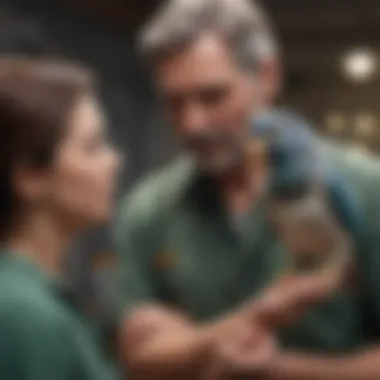
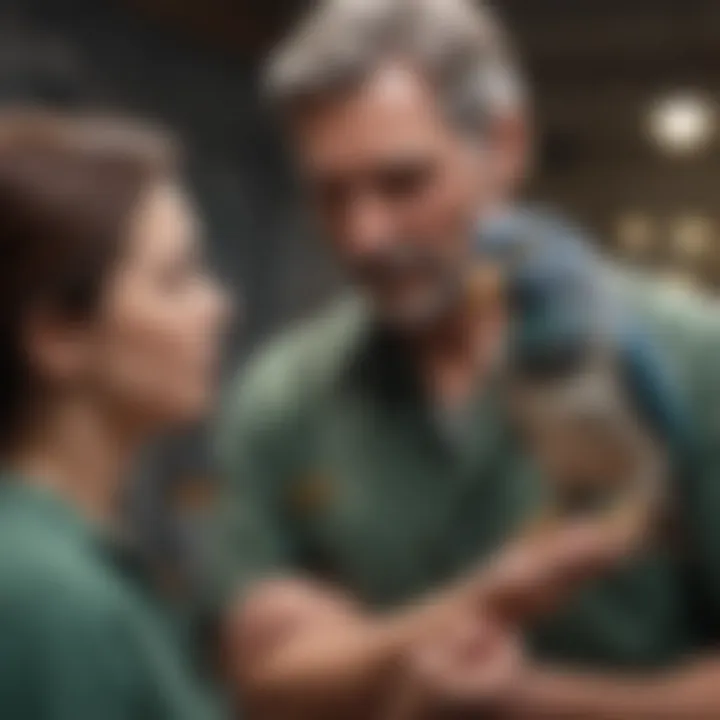
- Inactivity: If your bird, usually lively, is suddenly quiet or lethargic, it could signal distress.
- Difficulty Breathing: Rapid or labored breathing is a major red flag. Birds naturally have quicker respiratory rates, but any sign of gasping or puffing out their feathers needs urgent attention.
- Bleeding: Noticeable bleeding, whether from a wound or fecal substance indicating internal bleeding, should prompt an immediate trip to the vet.
- Vomiting or Diarrhea: Uncommon stool consistency or food being expelled can indicate poisoning or gastrointestinal distress.
- Changes in Beak or Feet: If your bird's beak shows distinct changes in color or if the feet seem injured or swollen, consider it an emergency.
It’s often advised to trust your instincts. If something seems off, don’t hesitate to contact your vet, even if it's after hours. Better safe than sorry, as they say.
Immediate Steps to Take During Emergencies
Once you've recognized an emergency, swift action becomes critical. Here’s what you can promptly do:
- Call Ahead: If you suspect an emergency, call your veterinary clinic or an emergency animal hospital before heading there. Inform them of the situation so they can prepare for your arrival.
- Remain Calm: Birds are sensitive creatures. If they sense anxiety in you, it might trigger stress in them, worsening their condition. Take deep breaths and focus on the task at hand.
- Prepare Transport: Have a safe, comfortable carrier ready. A small, dark-hued box works wonders, as many birds prefer dim environments when stressed. Avoid cages with excessive space as birds may harm themselves if they flap around in a panic.
- Keep Them Secure: While transporting, ensure your bird is secure but not overly confined. A loose towel can help keep them calm without restricting their movement too much.
- Observe and Document Changes: If time allows, write down or remember changes in behavior, diet, or any incident that might have led to your bird’s current state. This information can be invaluable for the vet.
In sum, being prepared to react swiftly during emergencies isn't just a good idea; it's a basic necessity for bird ownership. Your understanding, vigilance, and immediate actions can drastically influence the health outcomes for your avian companion.
The Role of Local Veterinary Services
When it comes to caring for our avian companions, the significance of local veterinary services cannot be overstated. Not only do these facilities provide immediate healthcare options for birds, but they also serve as resources for pet owners, fostering a community around avian welfare. In as much as birds are enchanting properties of our lives, they can be delicate creatures that require specialized knowledge and attention from vets familiar with their unique physiology and behavior. Having access to local veterinary services ensures that bird owners can quickly respond to health needs, establish lasting partnerships with experienced professionals, and stay current on best care practices.
Community Resources and Support
Local veterinary clinics often become more than just places for check-ups. They can be hubs for community resources and support. Many vets not only treat animals but also engage in outreach programs to educate pet owners about bird care, such as nutritional advice, common health problems, and preventative measures. Consider the following benefits of local community resources:
- Educational Workshops: Some clinics hold workshops that cover various topics from feather care to behavioral enrichment—qualities that make all the difference in enhancing your bird's quality of life.
- Support Networks: Engaging with like-minded owners allows you to gain insights into fellow bird enthusiasts’ experiences. This information can be invaluable and often you will find that others have been in similar situations with their feathered friends.
- Access to Specialists: In cases where specialized treatment is needed, local services often have networks to refer you to avian experts, ensuring that your bird receives expert care without having to travel far.
Building meaningful connections with local veterinary services encourages pet owners to be proactive rather than reactive when it comes to their bird's health.
Building a Relationship with Your Vet
Establishing a trusting relationship with your avian veterinarian is akin to building a partnership based on mutual respect and understanding. The bond formed between you and your vet not only creates a comfort level for future visits but can dramatically influence the overall health of your bird.
Here are some important aspects to consider when forming such a relationship:
- Open Communication: Being honest about your bird's habits, food intake, and any changes you observe can help your vet tailor their approach to your pet's health. Sharing specific details forms a complete picture.
- Regular Check-ups: By visiting your vet regularly, the doctor gets to know your bird’s personality, making it easier to spot subtle health changes during examinations.
- Involvement in Care: When you show interest in the treatment process and ask questions, it demonstrates to your veterinary team that you are invested in your bird’s well-being. This inclusive approach can lead to better health outcomes as your vet may provide tailored advice.
Building a relationship with your vet can make the difference between a routine visit and an informative, collaborative experience in your bird's healthcare journey.
Continual Education and Updates in Avian Health
The landscape of avian medicine is akin to a rapidly changing tide; staying updated is crucial not just for veterinary professionals but also for bird owners. This topic emphasizes that knowledge about avian health and best practices must be ongoing. Whether it’s newly recognized diseases, innovative treatment methods, or emerging best practices in avian care, continuous education ensures that both vets and owners are equipped to make informed decisions for their feathered companions.
In a world increasingly driven by advancements in technology and research, engaging with continual education allows both owners and vets to better serve the unique needs of their birds. As pet owners, having a solid understanding of the evolving nature of bird care is not just an advantage; it’s a necessity. By prioritizing education, owners can spot health issues early and understand preventive measures that could keep their birds thriving.
Staying Informed About Avian Medicine
Staying informed is easier than you might think. Regularly reading articles, journals, and books related to avian health can be a feather in the cap for bird owners. Resources like The Journal of Avian Medicine and Surgery provide valuable insights into cutting-edge research and treatments relevant to bird health.
Additionally, following reputable organizations such as the Association of Avian Veterinarians can help bird owners stay in the loop about veterinary best practices and guidelines tailored specifically for different species. Many of these organizations have newsletters and updates that can be beneficial for pet owners who want to blend their love of birds with a science-based understanding of avian health care.
The importance of integration of digital platforms cannot be ignored. Forums on websites such as reddit.com and active community groups on facebook.com can be excellent places for sharing experiences and tips. Interactions with other bird owners can also uncover hidden gems about health practices or surprising symptom notices that one might not find in the standard references.
Workshops and Community Interactions
Workshops, seminars, and community interactions represent an invaluable opportunity for owners to deepen their understanding of avian care. Local veterinary clinics sometimes host educational sessions focused on common health issues, proper nutrition, and even emergency care techniques.
Participating in these workshops isn’t merely an exercise; it’s akin to actively fortifying your bird's health fortress. Through hands-on experiences, owners can learn the correct methods for handling their birds during check-ups or emergencies, which is essential knowledge in nurturing trust between pet and owner.
Moreover, engaging with local bird clubs can bring about community connections. Interacting with fellow bird enthusiasts cultivates a support system where knowledge is constantly shared and expanded. Participating in such groups allows for discussions on bird care, sharing of resources, and even arranging local vet meet-and-greets to form bonds with the community. Little by little, with each piece of new knowledge, bird owners can cultivate a nurturing environment that reflects understanding, care, and love towards their pets.
"An informed bird owner is an empowered guardian. The effort placed in learning pays off in the health and happiness of your avian companion."
Finale: The Importance of Avian Veterinary Care
Taking care of birds isn’t just about feeding them and keeping their cages clean. In fact, avian veterinary care plays an essential role in ensuring that our feathered companions live long, healthy lives. Birds, unlike cats and dogs, are often less visible when it comes to expressing discomfort or illness. This makes regular visits to a qualified avian vet critical.
Having a dedicated veterinarian who understands the unique physiology and behavioral traits of birds can make all the difference. Specialized care can lead to early diagnosis of ailments that might otherwise go unnoticed. It's like having a personal coach who knows every player on the field, ready to assist at the smallest hint of trouble.
Moreover, regular check-ups can prevent various health issues from escalating. A vet can provide valuable insights into your bird's diet, environment, and behavioral changes, creating a holistic approach to avian health. Just like humans, birds benefit from preventative care, which can save both time and money in the long run.
Bird ownership is a commitment that involves understanding the nuances of their care. Making informed decisions—whether it’s about daily nutrition or choosing the right veterinarian—enhances not just the bird's well-being but also enriches the relationship you have with your pet. A healthy bird equals a happy home, and that’s what every bird owner aims for.
"An ounce of prevention is worth a pound of cure."
This rings especially true for avian care. By prioritizing health through regular vet visits and education about avian care, everyone can contribute positively to bird welfare. Engaging with veterinary professionals ensures that you are aligned with the best practices in bird care. Ultimately, it's about creating an environment where birds flourish.
Prioritizing Health in Bird Ownership
Birds may have small bodies, but they come packed with complexities. As a pet owner, it is your responsibility to take the initiative toward making their health a priority. It starts by establishing a relationship with a veterinarian skilled in avian medicine. But beyond merely finding the right vet, there are several steps you can take to ensure your pet thrives:
- Stay informed: Knowledge is power. Read about common avian health issues and preventative measures to maintain optimal health.
- Create a stable environment: Ensure that the living conditions are safe and conducive to your bird's happiness. Factors such as temperature, humidity, and cage size play crucial roles.
- Monitor their behavior: Keep an eye on changes in activity levels or eating habits. Early detection can lead to quicker, more effective responses.
- Regular health checks: Make it a practice to visit your avian vet for routine check-ups. Just like annual physicals for humans, these visits help keep tabs on your bird's overall health and any budding concerns.
Being proactive in your bird's health doesn’t have to be overwhelming. It’s a continuous journey of learning and adapting. You’re not only responsible for a pet; you’re a guardian to a creature that brings joy and companionship into your life. In doing so, you ensure that the relationship you cherish remains vibrant and fulfilling.







